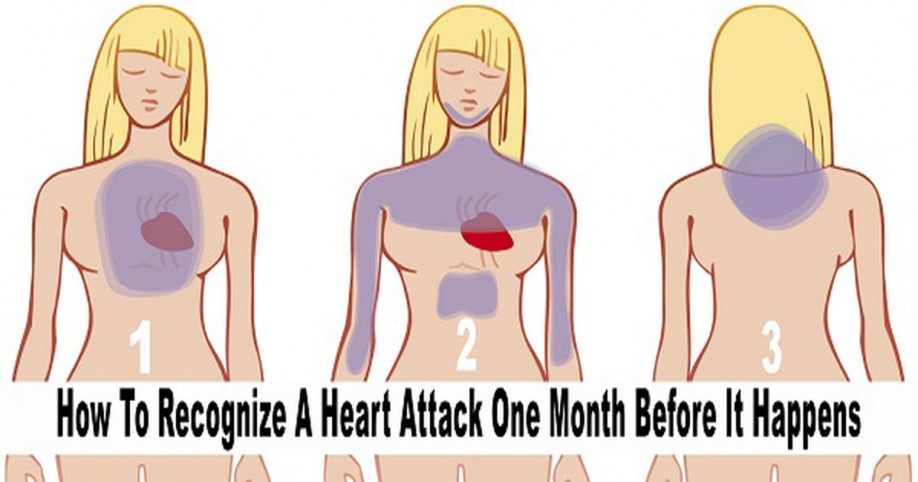Every year, almost eight hundred thousand people in North America suffer a heart attack. Many survive but some do not, especially if they’ve had more than one.
A heart attack is most often indicative of coronary heart disease, which is a cumulative deterioration of the heart and circulatory system. When arteries get clogged with plaque, undue pressure is put on the heart to process blood. As a muscle, the heart itself can become weakened and stop working properly.
A “heart attack” (myocardial infarction) can be caused by either coronary thrombosis (an arterial blood clot) or blocked blood supply to the heart.
The experience of a heart attack is different for everyone; there isn’t always sharp pain—sometimes it’s a general slow breakdown with mild symptoms. Knowing the signs of a heart attack can help you to take steps to stave it off.
Here’s what to look out for; if you experience one or more, see your doctor—don’t wait.
- Chest pressure – this is the most common symptom of coronary distress. Pressure, tightness, palpitations, or pain in the chest, upper abdomen, back, neck, jaw, arm, and/or shoulder are indications that blood supply has been limited.
- Cold and flu symptoms – coughing and wheezing are your body’s ways of trying to get blood flowing. A general feeling of “coming down with something”—especially in the presence of other symptoms—is a tell-tale sign that your heart is sick.
- Cold sweats and dizziness – sudden onset of regular sweating or clammy skin for no apparent reason is often a precursor to a heart attack. Dizziness is caused by lack of blood flow to the brain.
- Severe fatigue – there’s always a tipping point: coronary disease doesn’t happen overnight and when the heart has gotten to the point at which it can’t take it anymore, blood flow is severely restricted and there is a sudden significant drop in energy levels. Walking to the mailbox can feel like running a marathon. If this persists, consult your healthcare provider—immediately.
- General weakness – muscles aren’t getting the nourishment they need because they aren’t getting enough blood. You can tell if sudden sustained weakness—when every movement is a chore—is unusual.
- Shortness of breath – the lungs can’t function properly if the heart isn’t. If you find you can’t seem to take a full breath, the problem may not be your breathing apparatus but the restriction of blood from and to the heart.
Maintaining cardiovascular health isn’t exactly rocket science.
Educate yourself on nutrition . It may sound like a broken record (or an iPod stuck on Repeat) but regular physical activity, a diet of fresh vegetables, fruits, seeds, nuts, whole grains, and solid sources of healthy fats and proteins with extremely limited amounts of sugar and sodium will keep you healthy.
Herbs, spices, and other foods grown from the earth also contribute to all-around health.
Processed and fast foods, a sedentary lifestyle, pharmaceuticals, and chronic stress will make you sick in one way or another—no doubt about it.
Speaking of pharmaceuticals and heart attacks, here is an excerpt from the Abstract of a study published by the Journal of the American College of Cardiology in 1999:
“Heart failure is a clinical syndrome that is predominantly caused by cardiovascular disorders such as coronary heart disease and hypertension. However, several classes of drugs may induce heart failure in patients without concurrent cardiovascular disease or may precipitate the occurrence of heart failure in patients with preexisting left ventricular impairment…[there is a] potential role in the occurrence of heart failure of cytostatics, immunomodulating drugs, antidepressants, calcium channel blocking agents, nonsteroidal anti-inflammatory drugs, antiarrhythmics, beta-adrenoceptor blocking agents, anesthetics and some miscellaneous agents. Drug-induced heart failure may play a role in only a minority of the patients presenting with heart failure. Nevertheless, drug-induced heart failure should be regarded as a potentially preventable cause of heart failure…”
The Heart and Stroke Foundation estimates that “up to 80% of premature heart disease and stroke is preventable by adopting healthy behaviours.”
The very good news is that if you’re alive, it’s not too late to change things.
